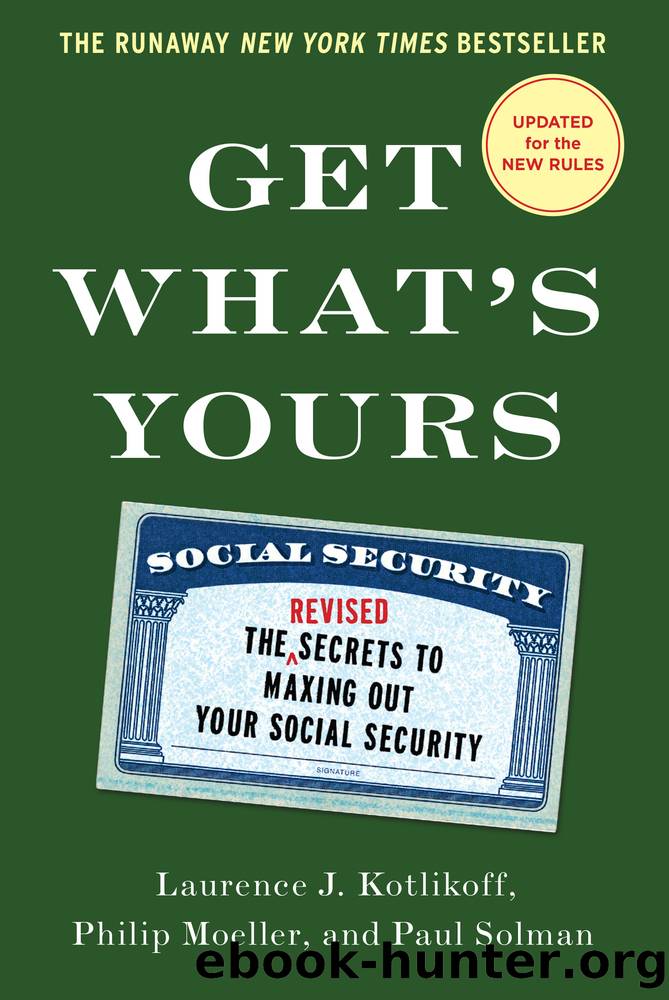Get What's Yours by Laurence J. Kotlikoff & Philip Moeller & Paul Solman

Author:Laurence J. Kotlikoff & Philip Moeller & Paul Solman
Language: eng
Format: epub
Publisher: Simon & Schuster
Published: 2015-02-17T00:00:00+00:00
TIME FOR ANOTHER EXAMPLE
To return from the abstract to the concrete, hereâs a seemingly straightforward email from a Texas woman:
My husband died yesterday. I live in Houston, Texas. Am I entitled to his Social Security paycheck?
Well, the easy answer is âno, youâre entitled to your own Social Security paycheck, in the form of your survivorâs benefit.â But if the emailer means âAm I entitled to the amount of my late husbandâs paycheck?â the answer, unfortunately, is that, as with Helenâs situation, thereâs no way to say without knowing exactly how much the husband was receiving, based on his earnings record, when he starting taking his benefits, and when the surviving widow decides to take her survivorâs benefit.
The point of this case study is that Social Security does not make the process of finding such information easy. Here is what a widow like this woman in Houston would have to go through when trying to determine when to take her survivor benefit.
First thing first. If she is 60 or over (or 50 or older and disabled), she can collect widowâs benefits starting immediately, subject to the Earnings Test and early claiming reductions if she is younger than her FRA. Thatâs the easy part of the answer. But how much will her widowâs benefit be? It hinges on who takes (or in this case, took) their benefits when. There are four different situations to consider, and each one yields a different answer: (1) both wait (waited) until full eligibility age; (2) husband waited (until FRA) but wife now takes early; (3) husband took early, wife now waits; (4) both take (or took) early. Because there are bound to be readers facing the situation sketched in the email, weâll consider the answers one painstaking permutation at a time.
1. If the husband took his retirement benefit after FRA and the widow takes the widowâs benefit at or after her own FRA, she will, indeed, receive his actual retirement benefitâhis full retirement benefit inclusive of his Delayed Retirement Credits. As it happens, this may be even more than the check he was receiving each month. Why? Because his monthly Medicare Part B premium may have been withheld from his monthly Social Security check and of course those premiums no longer need to be paid. His check may also have been less than his retirement benefit for another reason: Social Security may have been withholding some of his retirement benefit for income taxes and the amount of this withholding could decline if his widow is in a lower federal income tax bracket after he dies.
2. Even if the husband took his retirement benefit at FRA, if the widow took her widowâs benefit before FRA, her survivor benefit will be reduced. For example, it will be reduced by 28.5 percent if she took it at 60.
3. Now suppose the opposite: the husband took his retirement benefit early and the widow waits to take her widowâs benefit until her full retirement age. In that case, the survivorâs benefit
Download
This site does not store any files on its server. We only index and link to content provided by other sites. Please contact the content providers to delete copyright contents if any and email us, we'll remove relevant links or contents immediately.
The Secret History by Donna Tartt(19053)
The Social Justice Warrior Handbook by Lisa De Pasquale(12187)
Thirteen Reasons Why by Jay Asher(8893)
This Is How You Lose Her by Junot Diaz(6877)
Weapons of Math Destruction by Cathy O'Neil(6265)
Zero to One by Peter Thiel(5787)
Beartown by Fredrik Backman(5737)
The Myth of the Strong Leader by Archie Brown(5500)
The Fire Next Time by James Baldwin(5431)
How Democracies Die by Steven Levitsky & Daniel Ziblatt(5215)
Promise Me, Dad by Joe Biden(5141)
Stone's Rules by Roger Stone(5081)
A Higher Loyalty: Truth, Lies, and Leadership by James Comey(4954)
100 Deadly Skills by Clint Emerson(4921)
Rise and Kill First by Ronen Bergman(4780)
Secrecy World by Jake Bernstein(4741)
The David Icke Guide to the Global Conspiracy (and how to end it) by David Icke(4709)
The Farm by Tom Rob Smith(4502)
The Doomsday Machine by Daniel Ellsberg(4484)
